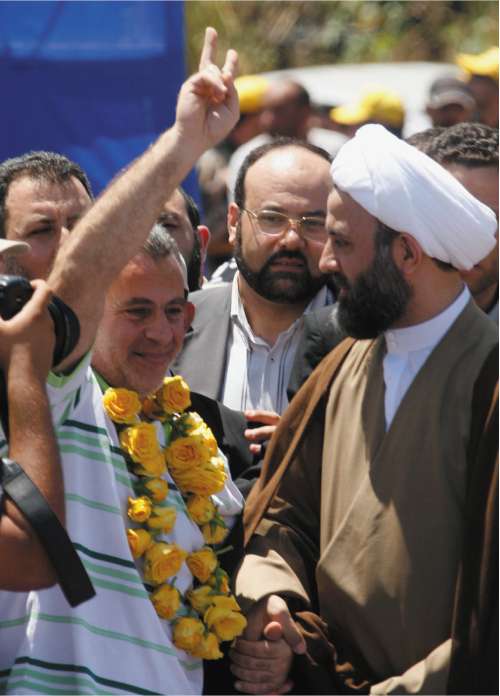Hizbollah hands over Israeli troop remains as Lebanese spy is freed

Your support helps us to tell the story
From reproductive rights to climate change to Big Tech, The Independent is on the ground when the story is developing. Whether it's investigating the financials of Elon Musk's pro-Trump PAC or producing our latest documentary, 'The A Word', which shines a light on the American women fighting for reproductive rights, we know how important it is to parse out the facts from the messaging.
At such a critical moment in US history, we need reporters on the ground. Your donation allows us to keep sending journalists to speak to both sides of the story.
The Independent is trusted by Americans across the entire political spectrum. And unlike many other quality news outlets, we choose not to lock Americans out of our reporting and analysis with paywalls. We believe quality journalism should be available to everyone, paid for by those who can afford it.
Your support makes all the difference.A prisoner convicted of spying for Hizbollah was released to Lebanon by Israel yesterday as the guerrilla group handed over what it said were the remains of dead Israeli soldiers.
The cross-border moves raised speculation that Israel could be preparing to trade other prisoners for the two soldiers – whether dead or alive – whose abduction triggered the 2006 Lebanon war.
The Hizbollah leader, Hassan Nasrallah, predicted last week that Israel would soon free Lebanese prisoners including Samir Kuntar, who is serving multiple life sentences for murdering four Israelis – including a 28-year-old civilian and his four-year-old daughter – in 1979.
In Beirut, Frank-Walter Steinmeier, the German Foreign Minister, who has been mediating between the two enemies, said he was happy with yesterday's developments and that he hoped "these preliminary steps have created a positive dynamism in these secret talks".
The man released yesterday and driven from a jail in central Israel to the border town of Rosh Hanikra was Nasim Nisr, an Israeli of Lebanese descent who had already served a six-year sentence for espionage and was being held in administrative detention, possibly as a bargaining chip.
The 39-year-old prisoner was shown live on Lebanese TV arriving at the southern village of Naqoura and hugging weeping relatives, including his mother, a Lebanese Jew who converted to Islam. He briefly praised Mr Nasrallah and said he hoped other Lebanese prisoners would be released. Because of his Jewish descent, Mr Nisr, whose father was a Shia Muslim, qualified for Israeli citizenship, and had moved to Israel in 1991.
The box of remains released by Hizbollah was checked by the Israeli military for booby traps before being transported to the Abu Kabir forensic laboratory in Tel Aviv for evaluation. The Israeli authorities insisted that the release of the remains was unexpected and had not been co-ordinated by them with Hizbollah.
Israel has not confirmed plans for a swap of other Lebanese prisoners for Eldad Regev and Ehud Goldwasser, the two soldiers abducted and, it later turned out, seriously injured in Hizbollah's cross-border raid in July 2006. Hizbollah has not provided any proof that the two soldiers are still alive.
A swap involving Kuntar would be politically sensitive in Israel because of the notoriety of the 1979 killings in Nahariya. He was convicted of killing the child by smashing her head against rocks and then hitting it with a rifle butt. The girl's mother accidentally smothered her other daughter, aged two, to death while trying to keep her silent as they hid during the attack.
An editorial in Haaretz before yesterday's events warned that an exchange of prisoners including Kuntar for the two Israeli soldiers would mark a "complete victory for Nasrallah" over Ehud Olmert's government.
The newspaper said that this "bitter pill" could be swallowed if the two soldiers were alive but that the "price" must be lower if the two men were dead. "Israel must not release prisoners for bodies, thus encouraging more abductions," it said.
Meanwhile, the Israeli Housing Minister, Zeev Boim, announced fresh plans to build nearly 900 new homes in Pisgat Zeev and Har Homa, Jewish settlements in East Jerusalem, despite the urgings of the US against such expansion on the Palestinian side of the 1967 border.
Yasser Abed Rabbo, a senior aide to Palestinian President Mahmoud Abbas, said: "Israel talks about peace while at the same time works on undermining peace by increasing settlement activity in Jerusalem and around it."
Join our commenting forum
Join thought-provoking conversations, follow other Independent readers and see their replies
Comments